INFINITI Q50 HYBRID 2014 Dismantling Guide
Manufacturer: INFINITI, Model Year: 2014, Model line: Q50 HYBRID, Model: INFINITI Q50 HYBRID 2014Pages: 54, PDF Size: 3.04 MB
Page 1 of 54
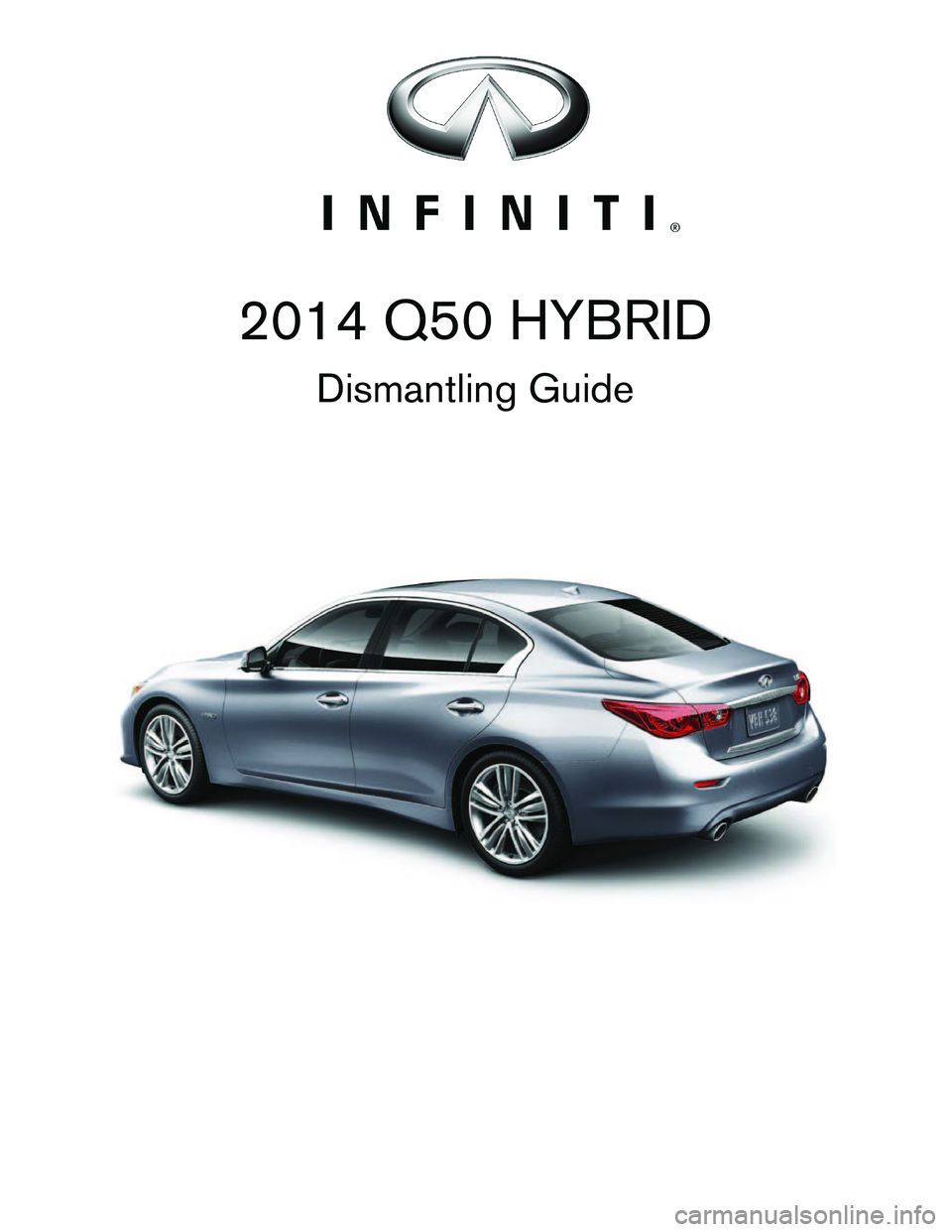
Page 2 of 54
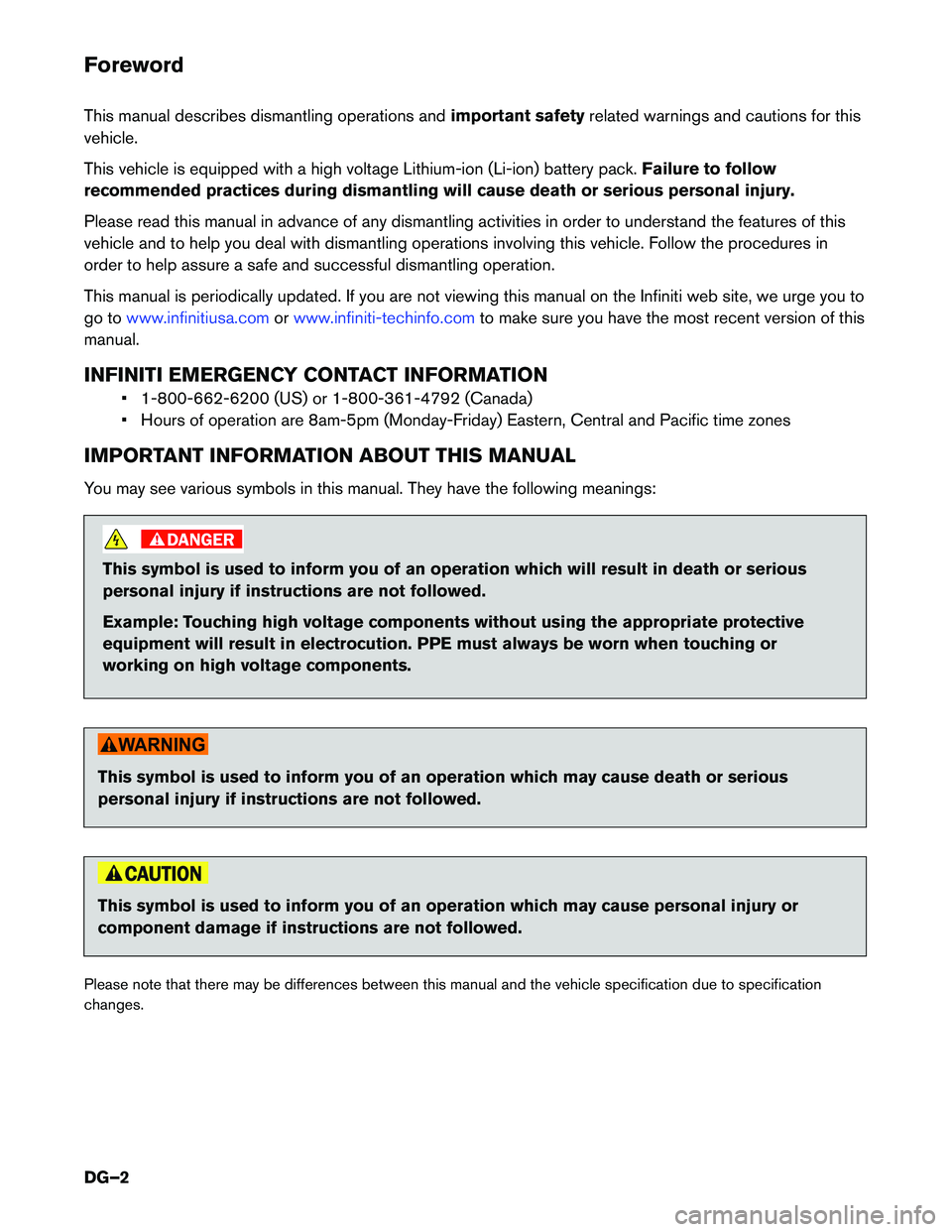
Foreword
This manual describes dismantling operations andimportant safetyrelated warnings and cautions for this
vehicle.
This vehicle is equipped with a high voltage Lithium-ion (Li-ion) battery pack. Failure to follow
recommended practices during dismantling will cause death or serious personal injury.
Please read this manual in advance of any dismantling activities in order to understand the features of this
vehicle and to help you deal with dismantling operations involving this vehicle. Follow the procedures in
order to help assure a safe and successful dismantling operation.
This manual is periodically updated. If you are not viewing this manual on the Infiniti web site, we urge you to
go to
www.infinitiusa.comorwww.infiniti-techinfo.comto make sure you have the most recent version of this
manual.
INFINITI EMERGENCY CONTACT INFORMATION
• 1-800-662-6200 (US) or 1-800-361-4792 (Canada)
• Hours of operation are 8am-5pm (Monday-Friday) Eastern, Central and Pacific time zones
IMPORTANT INFORMATION ABOUT THIS MANUAL
You may see various symbols in this manual. They have the following meanings:
This symbol is used to inform you of an operation which will result in death or serious
personal injury if instructions are not followed.
Example: Touching high voltage components without using the appropriate protective
equipment will result in electrocution. PPE must always be worn when touching or
working on high voltage components.
This symbol is used to inform you of an operation which may cause death or serious
personal injury if instructions are not followed.
This symbol is used to inform you of an operation which may cause personal injury or
component damage if instructions are not followed.
Please note that there may be differences between this manual and the vehicle specification due to specification changes. DG–2
Page 3 of 54
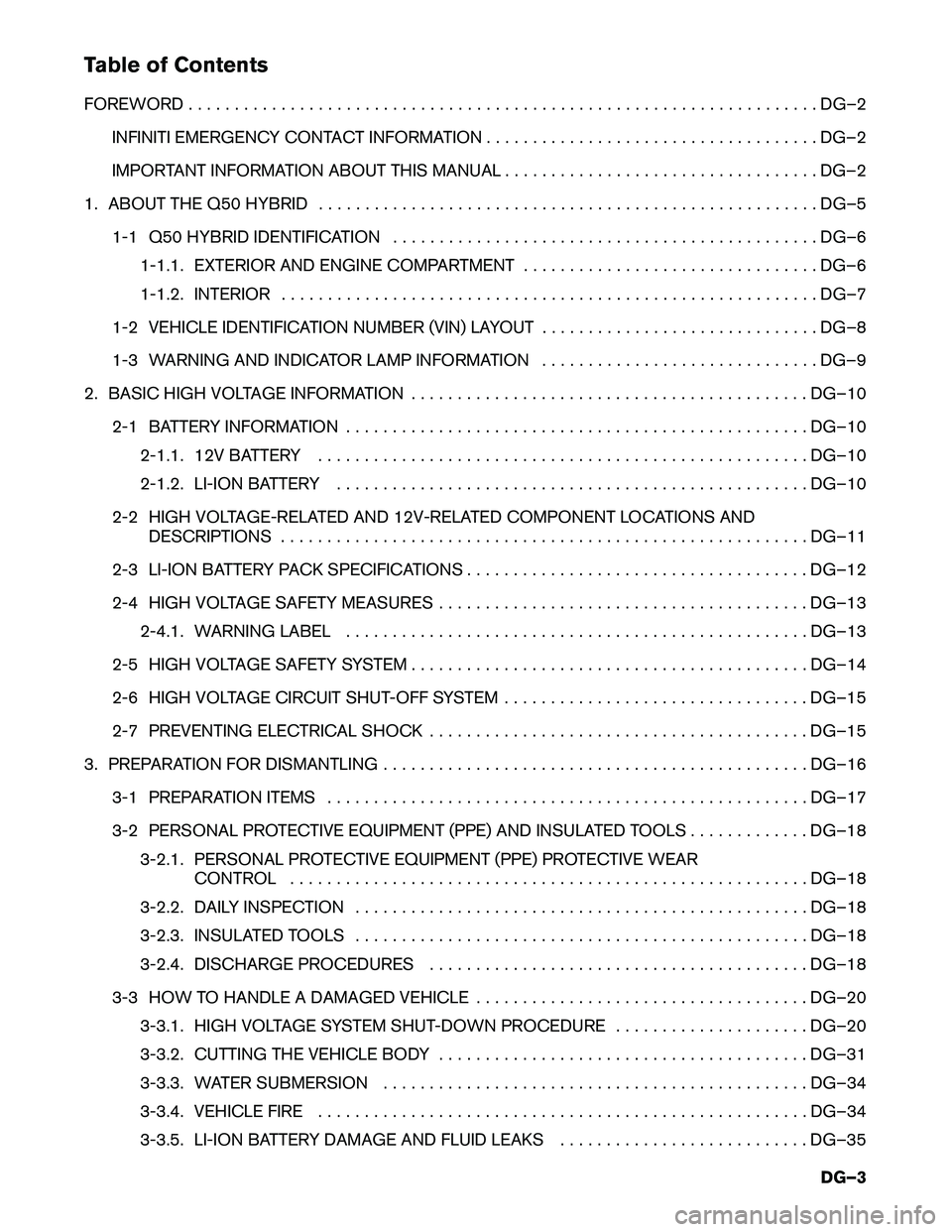
Table of Contents
FOREWORD . . . . . . . . . . . . . . . . . . . . . . . . . . . . . . . . . . . . . . . . . . . . . . . . . .. . . . . . . . . . . . . . . . . . DG–2
INFINITI EMERGENCY CONTACT INFORMATION . . . . . . . . . . . . . . . . . . . . . . . . . . . . . . . . . . . . DG–2
IMPORTANT INFORMATION ABOUT THIS MANUAL . . . . . . . . . . . . . . . . . . . . . . . . . . . . . . . . . . DG–2
1. ABOUT THE Q50 HYBRID . . . . . . . . . . . . . . . . . . . . . . . . . . . . . . . . . . . . . . . . . . . . . . . . . . . . . . DG–5
1-1 Q50 HYBRID IDENTIFICATION . . . . . . . . . . . . . . . . . . . . . . . . . . . . . . . . . . . . . . . . . . . . . . DG–6
1-1.1. EXTERIOR AND ENGINE COMPARTMENT . . . . . . . . . . . . . . . . . . . . . . . . . . . . . . . . DG–6
1-1.2. INTERIOR . . . . . . . . . . . . . . . . . . . . . . . . . . . . . . . . . . . . . . . . . . . . . . . . . . . . . . . . . . DG–7
1-2 VEHICLE IDENTIFICATION NUMBER (VIN) LAYOUT . . . . . . . . . . . . . . . . . . . . . . . . . . . . . . DG–8
1-3 WARNING AND INDICATOR LAMP INFORMATION . . . . . . . . . . . . . . . . . . . . . . . . . . . . . . DG–9
2. BASIC HIGH VOLTAGE INFORMATION . . . . . . . . . . . . . . . . . . . . . . . . . . . . . . . . . . . . . . . . . . . DG–10
2-1 BATTERY INFORMATION . . . . . . . . . . . . . . . . . . . . . . . . . . . . . . . . . . . . . . . . . . . . . . . . . . DG–10
2-1.1. 12V BATTERY . . . . . . . . . . . . . . . . . . . . . . . . . . . . . . . . . . . . . . . . . . . . . . . . . . . . . DG–10
2-1.2. LI-ION BATTERY . . . . . . . . . . . . . . . . . . . . . . . . . . . . . . . . . . . . . . . . . . . . . . . . . . . DG–10
2-2 HIGH VOLTAGE-RELATED AND 12V-RELATED COMPONENT LOCATIONS AND DESCRIPTIONS . . . . . . . . . . . . . . . . . . . . . . . . . . . . . . . . . . . . . . . . . . . . . . . . . . . . . . . . . DG–11
2-3 LI-ION BATTERY PACK SPECIFICATIONS . . . . . . . . . . . . . . . . . . . . . . . . . . . . . . . . . . . . . DG–12
2-4 HIGH VOLTAGE SAFETY MEASURES . . . . . . . . . . . . . . . . . . . . . . . . . . . . . . . . . . . . . . . . DG–13 2-4.1. WARNING LABEL . . . . . . . . . . . . . . . . . . . . . . . . . . . . . . . . . . . . . . . . . . . . . . . . . . DG–13
2-5 HIGH VOLTAGE SAFETY SYSTEM . . . . . . . . . . . . . . . . . . . . . . . . . . . . . . . . . . . . . . . . . . . DG–14
2-6 HIGH VOLTAGE CIRCUIT SHUT-OFF SYSTEM . . . . . . . . . . . . . . . . . . . . . . . . . . . . . . . . . DG–15
2-7 PREVENTING ELECTRICAL SHOCK . . . . . . . . . . . . . . . . . . . . . . . . . . . . . . . . . . . . . . . . . DG–15
3. PREPARATION FOR DISMANTLING . . . . . . . . . . . . . . . . . . . . . . . . . . . . . . . . . . . . . . . . . . . . . . DG–16
3-1 PREPARATION ITEMS . . . . . . . . . . . . . . . . . . . . . . . . . . . . . . . . . . . . . . . . . . . . . . . . . . . . DG–17
3-2 PERSONAL PROTECTIVE EQUIPMENT (PPE) AND INSULATED TOOLS . . . . . . . . . . . . . DG–18 3-2.1. PERSONAL PROTECTIVE EQUIPMENT (PPE) PROTECTIVE WEAR CONTROL . . . . . . . . . . . . . . . . . . . . . . . . . . . . . . . . . . . . . . . . . . . . . . . . . . . . . . . . DG–18
3-2.2. DAILY INSPECTION . . . . . . . . . . . . . . . . . . . . . . . . . . . . . . . . . . . . . . . . . . . . . . . . . DG–18
3-2.3. INSULATED TOOLS . . . . . . . . . . . . . . . . . . . . . . . . . . . . . . . . . . . . . . . . . . . . . . . . . DG–18
3-2.4. DISCHARGE PROCEDURES . . . . . . . . . . . . . . . . . . . . . . . . . . . . . . . . . . . . . . . . . DG–18
3-3 HOW TO HANDLE A DAMAGED VEHICLE . . . . . . . . . . . . . . . . . . . . . . . . . . . . . . . . . . . . DG–20 3-3.1. HIGH VOLTAGE SYSTEM SHUT-DOWN PROCEDURE . . . . . . . . . . . . . . . . . . . . . DG–20
3-3.2. CUTTING THE VEHICLE BODY . . . . . . . . . . . . . . . . . . . . . . . . . . . . . . . . . . . . . . . . DG–31
3-3.3. WATER SUBMERSION . . . . . . . . . . . . . . . . . . . . . . . . . . . . . . . . . . . . . . . . . . . . . . DG–34
3-3.4. VEHICLE FIRE . . . . . . . . . . . . . . . . . . . . . . . . . . . . . . . . . . . . . . . . . . . . . . . . . . . . . DG–34
3-3.5. LI-ION BATTERY DAMAGE AND FLUID LEAKS . . . . . . . . . . . . . . . . . . . . . . . . . . . DG–35
DG–3
Page 4 of 54
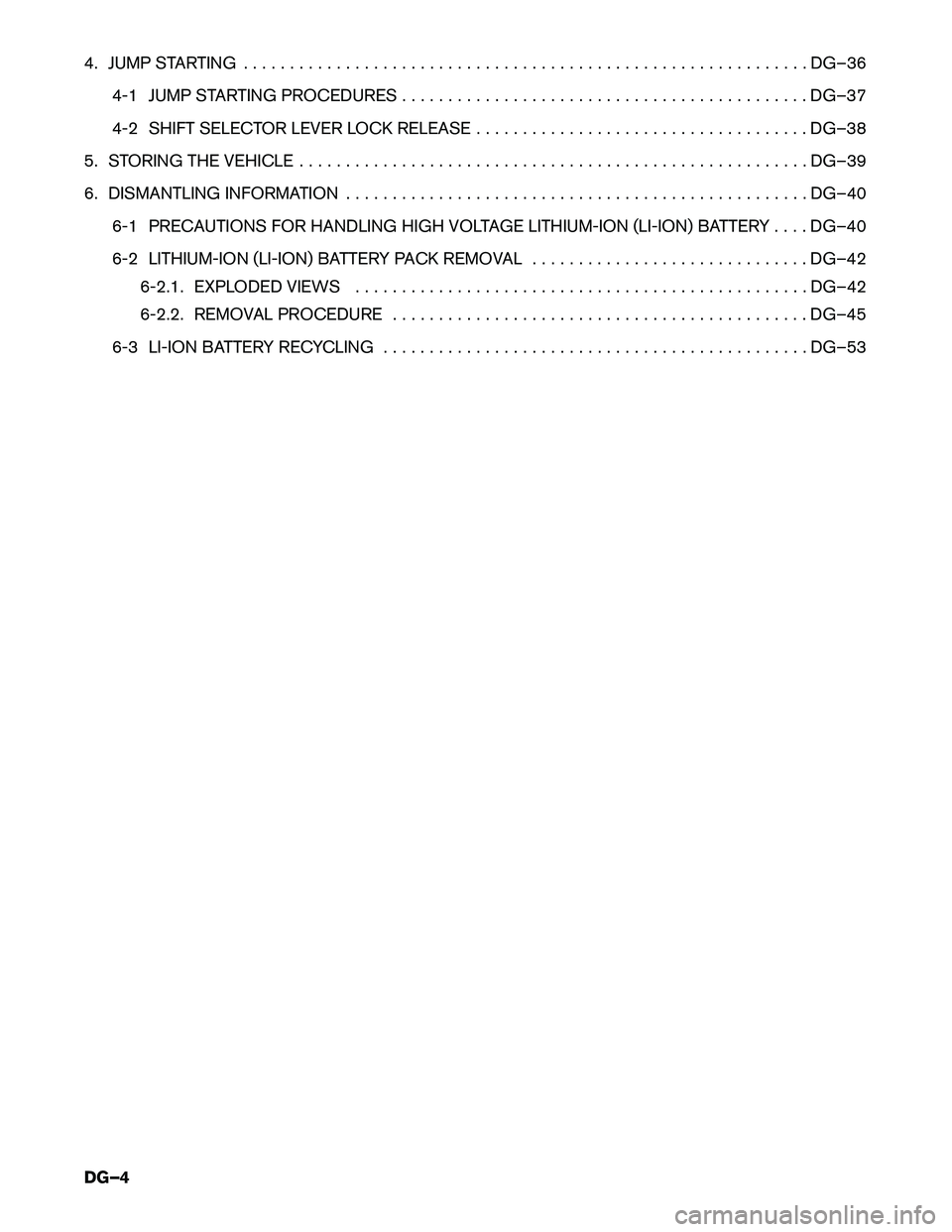
4. JUMP STARTING . . . . . . . . . . . . . . . . . . . . . . . . . . . . . . . . . . . . . . . . . . . . . . .. . . . . . . . . . . . . . DG–36
4-1 JUMP STARTING PROCEDURES . . . . . . . . . . . . . . . . . . . . . . . . . . . . . . . . . . . . . . . . . . . . DG–37
4-2 SHIFT SELECTOR LEVER LOCK RELEASE . . . . . . . . . . . . . . . . . . . . . . . . . . . . . . . . . . . . DG–38
5. STORING THE VEHICLE . . . . . . . . . . . . . . . . . . . . . . . . . . . . . . . . . . . . . . . . . . . . . . . . . . . . . . . DG–39
6. DISMANTLING INFORMATION . . . . . . . . . . . . . . . . . . . . . . . . . . . . . . . . . . . . . . . . . . . . . . . . . . DG–40
6-1 PRECAUTIONS FOR HANDLING HIGH VOLTAGE LITHIUM-ION (LI-ION) BATTERY . . . . DG–40
6-2 LITHIUM-ION (LI-ION) BATTERY PACK REMOVAL . . . . . . . . . . . . . . . . . . . . . . . . . . . . . . DG–42 6-2.1. EXPLODED VIEWS . . . . . . . . . . . . . . . . . . . . . . . . . . . . . . . . . . . . . . . . . . . . . . . . . DG–42
6-2.2. REMOVAL PROCEDURE . . . . . . . . . . . . . . . . . . . . . . . . . . . . . . . . . . . . . . . . . . . . . DG–45
6-3 LI-ION BATTERY RECYCLING . . . . . . . . . . . . . . . . . . . . . . . . . . . . . . . . . . . . . . . . . . . . . . DG–53
DG–4
Page 5 of 54
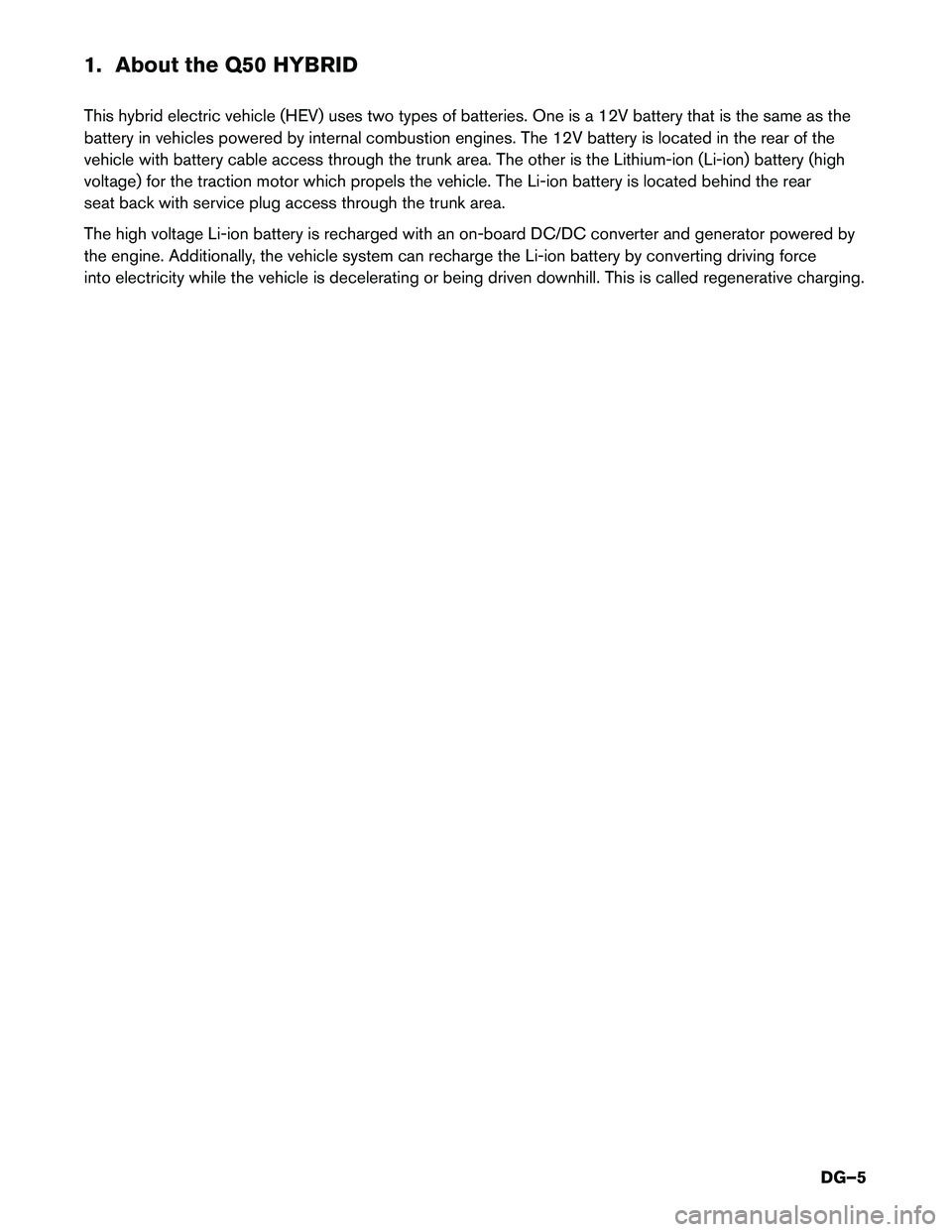
1. About the Q50 HYBRID
This hybrid electric vehicle (HEV) uses two types of batteries. One is a 12V battery that is the same as the
battery in vehicles powered by internal combustion engines. The 12V battery is located in the rear of the
vehicle with battery cable access through the trunk area. The other is the Lithium-ion (Li-ion) battery (high
voltage) for the traction motor which propels the vehicle. The Li-ion battery is located behind the rear
seat back with service plug access through the trunk area.
The high voltage Li-ion battery is recharged with an on-board DC/DC converter and generator powered by
the engine. Additionally, the vehicle system can recharge the Li-ion battery by converting driving force
into electricity while the vehicle is decelerating or being driven downhill. This is called regenerative charging.DG–5
Page 6 of 54
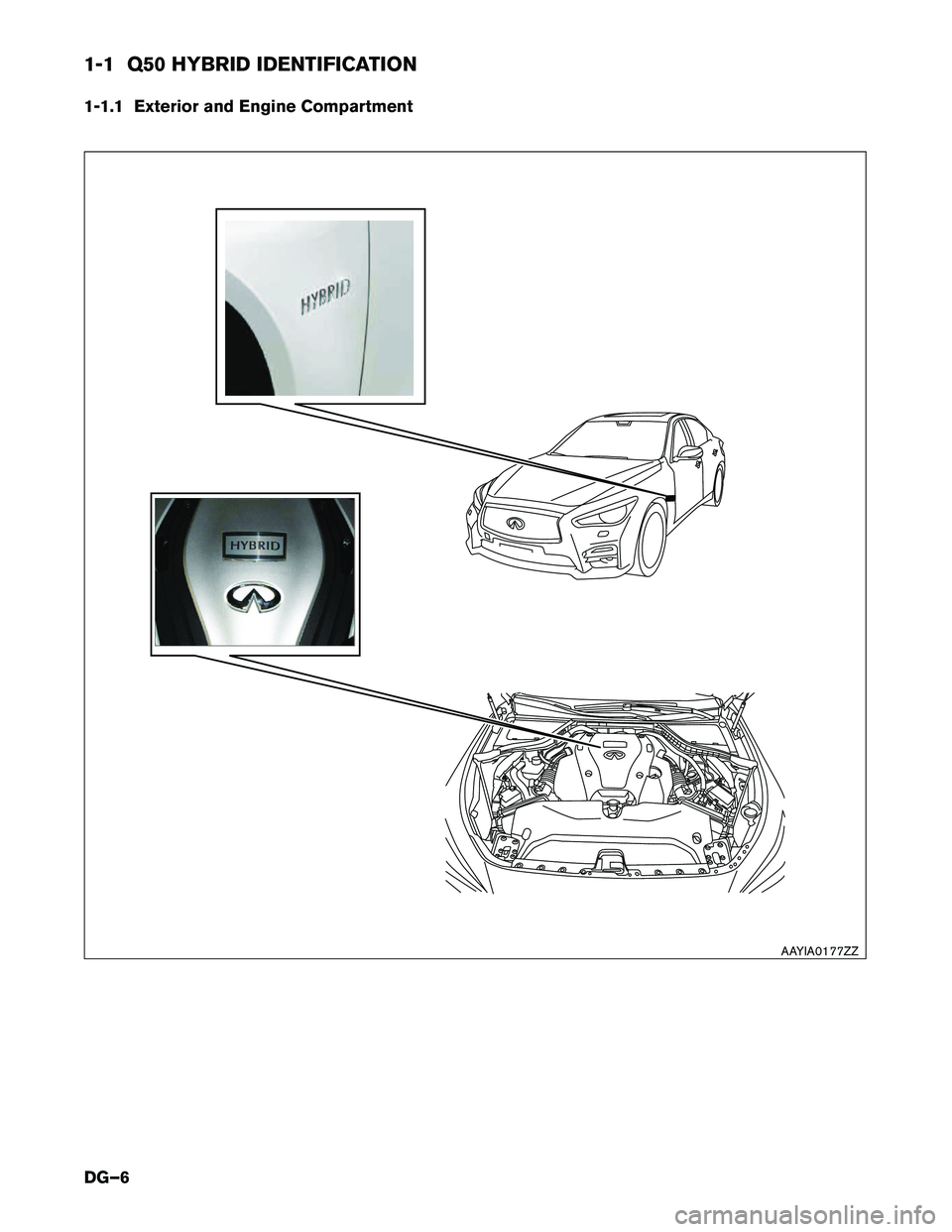
1-1 Q50 HYBRID IDENTIFICATION
1-1.1 Exterior and Engine Compartment
AAYIA0177ZZ
DG–6
Page 7 of 54
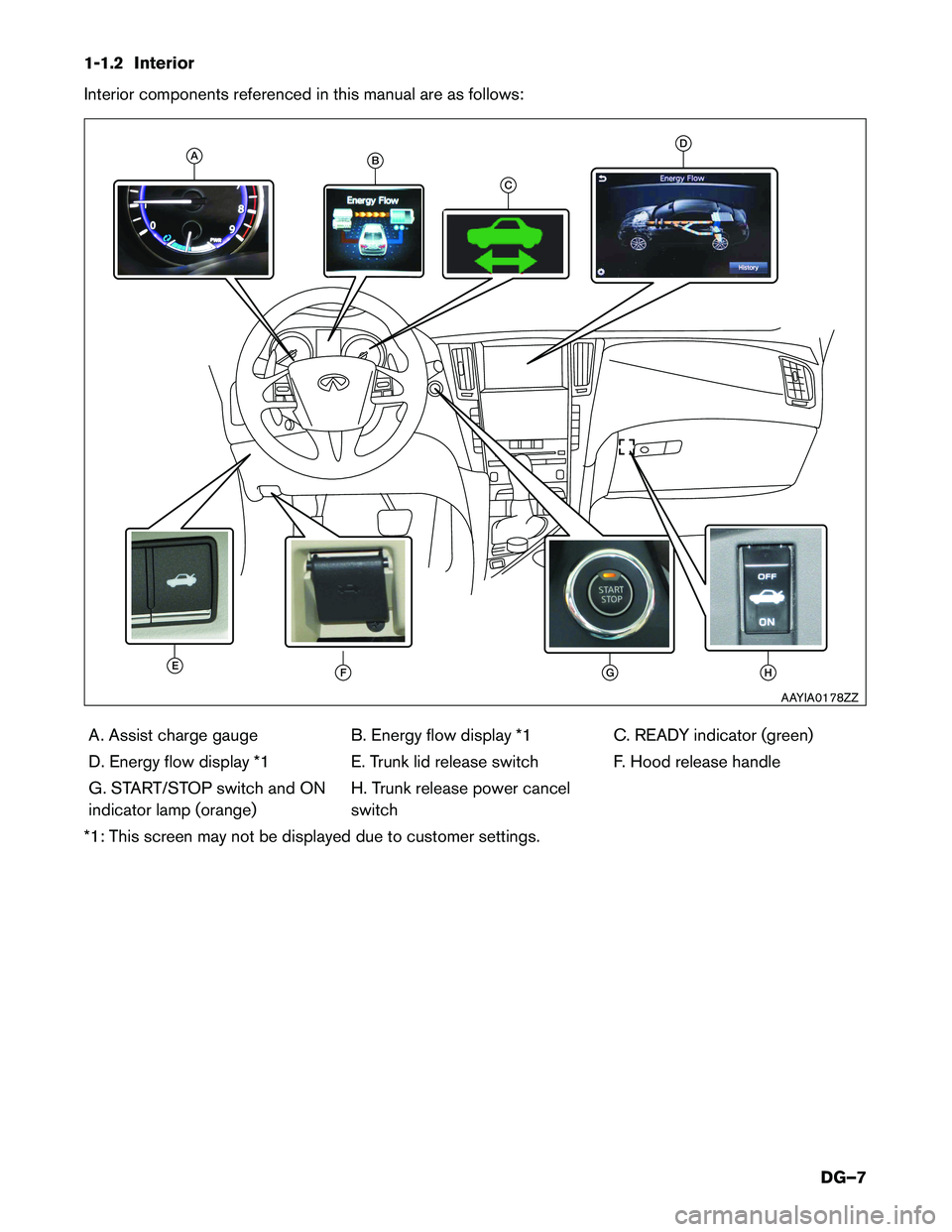
1-1.2 Interior
Interior components referenced in this manual are as follows:A. Assist charge gauge B. Energy flow display *1 C. READY indicator (green)
D. Energy flow display *1 E. Trunk lid release switch F. Hood release handle
G. START/STOP switch and ON
indicator lamp (orange) H. Trunk release power cancelswitch
*1: This screen may not be displayed due to customer settings.
A
FGEH
B
C
D
AAYIA0178ZZ
DG–7
Page 8 of 54
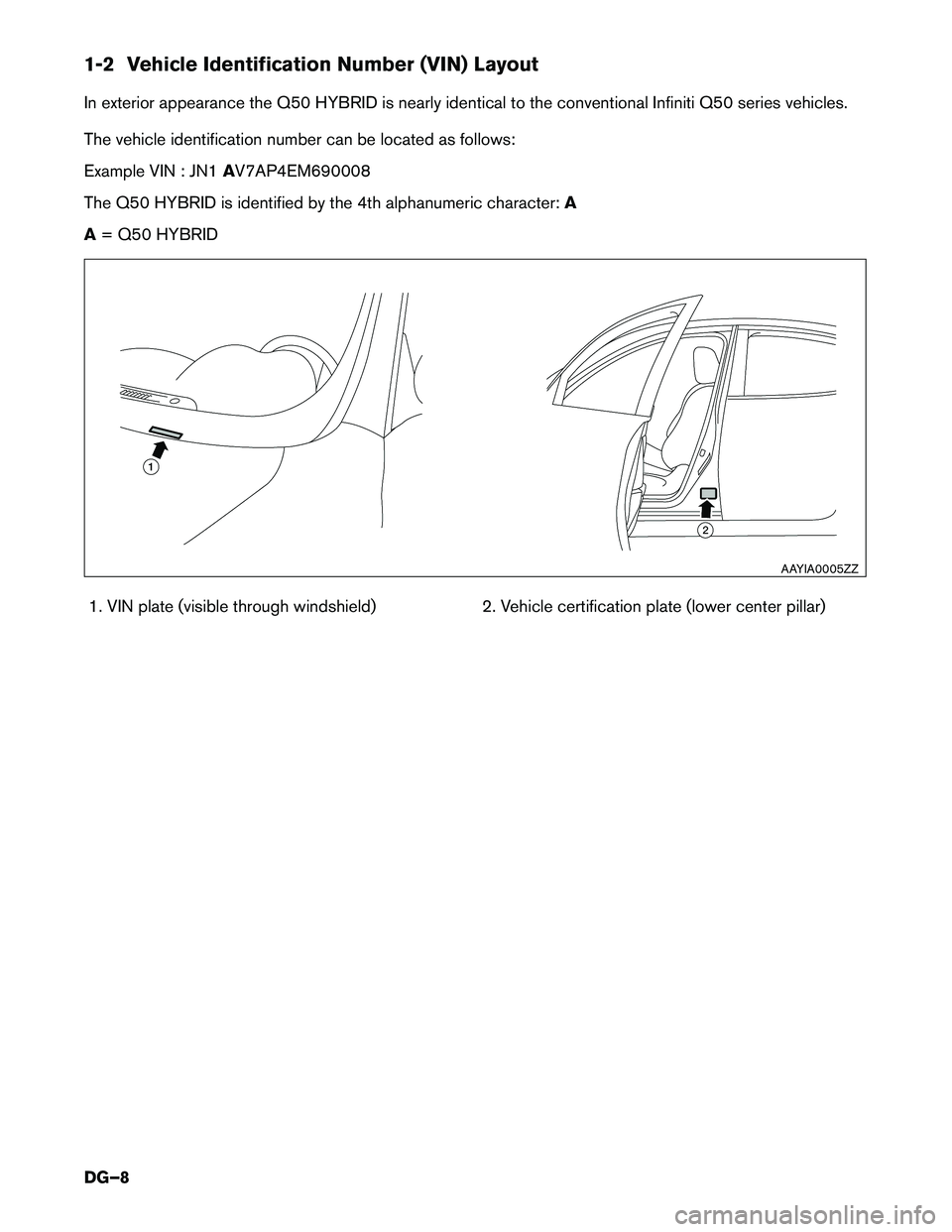
1-2 Vehicle Identification Number (VIN) Layout
In exterior appearance the Q50 HYBRID is nearly identical to the conventional Infiniti Q50 series vehicles.
The vehicle identification number can be located as follows:
Example VIN : JN1AV7AP4EM690008
The Q50 HYBRID is identified by the 4th alphanumeric character: A
A = Q50 HYBRID
1. VIN plate (visible through windshield) 2. Vehicle certification plate (lower center pillar)
AAYIA0005ZZ
DG–8
Page 9 of 54
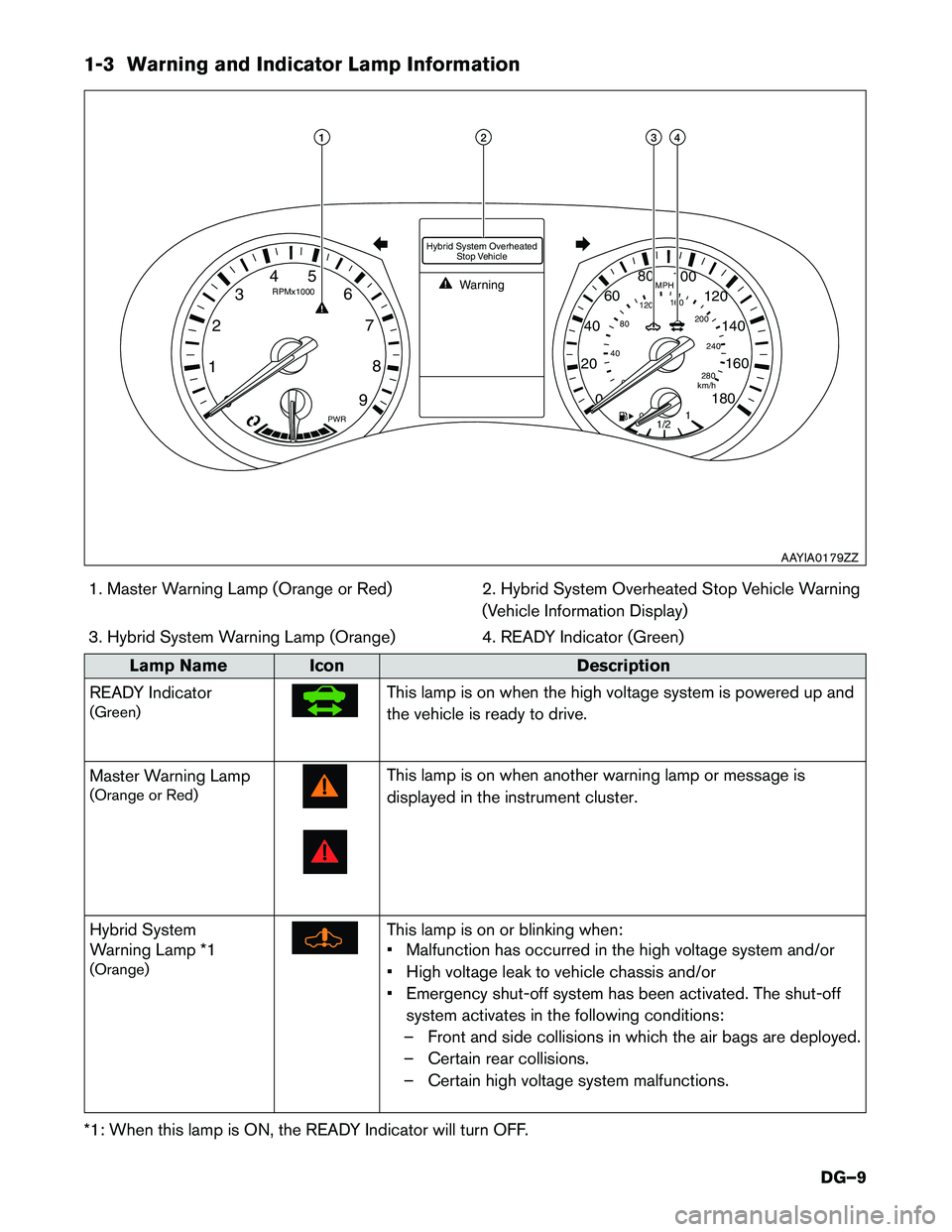
1-3 Warning and Indicator Lamp Information1. Master Warning Lamp (Orange or Red) 2. Hybrid System Overheated Stop Vehicle Warning (Vehicle Information Display)
3. Hybrid System Warning Lamp (Orange) 4. READY Indicator (Green)
Lamp Name Icon Description
READY Indicator (Green)
This lamp is on when the high voltage system is powered up and
the vehicle is ready to drive.
Master Warning Lamp
(Orange or Red)
This lamp is on when another warning lamp or message is
displayed in the instrument cluster.
Hybrid System
Warning Lamp *1 (Orange)
This lamp is on or blinking when:
• Malfunction has occurred in the high voltage system and/or
• High voltage leak to vehicle chassis and/or
• Emergency shut-off system has been activated. The shut-off system activates in the following conditions:
– Front and side collisions in which the air bags are deployed.
– Certain rear collisions.
– Certain high voltage system malfunctions.
*1: When this lamp is ON, the READY Indicator will turn OFF.
00 0
40
80
120
160
200
240
280
km/h
MPH
20
40
1 2
3
4 5
6
7
8
9
0
PWR
RPMx1000
6080
100
120
140
160
180
1
1/2
1234
Hybrid System Overheated Stop Vehicle
Warning
AAYIA0179ZZ
DG–9
Page 10 of 54
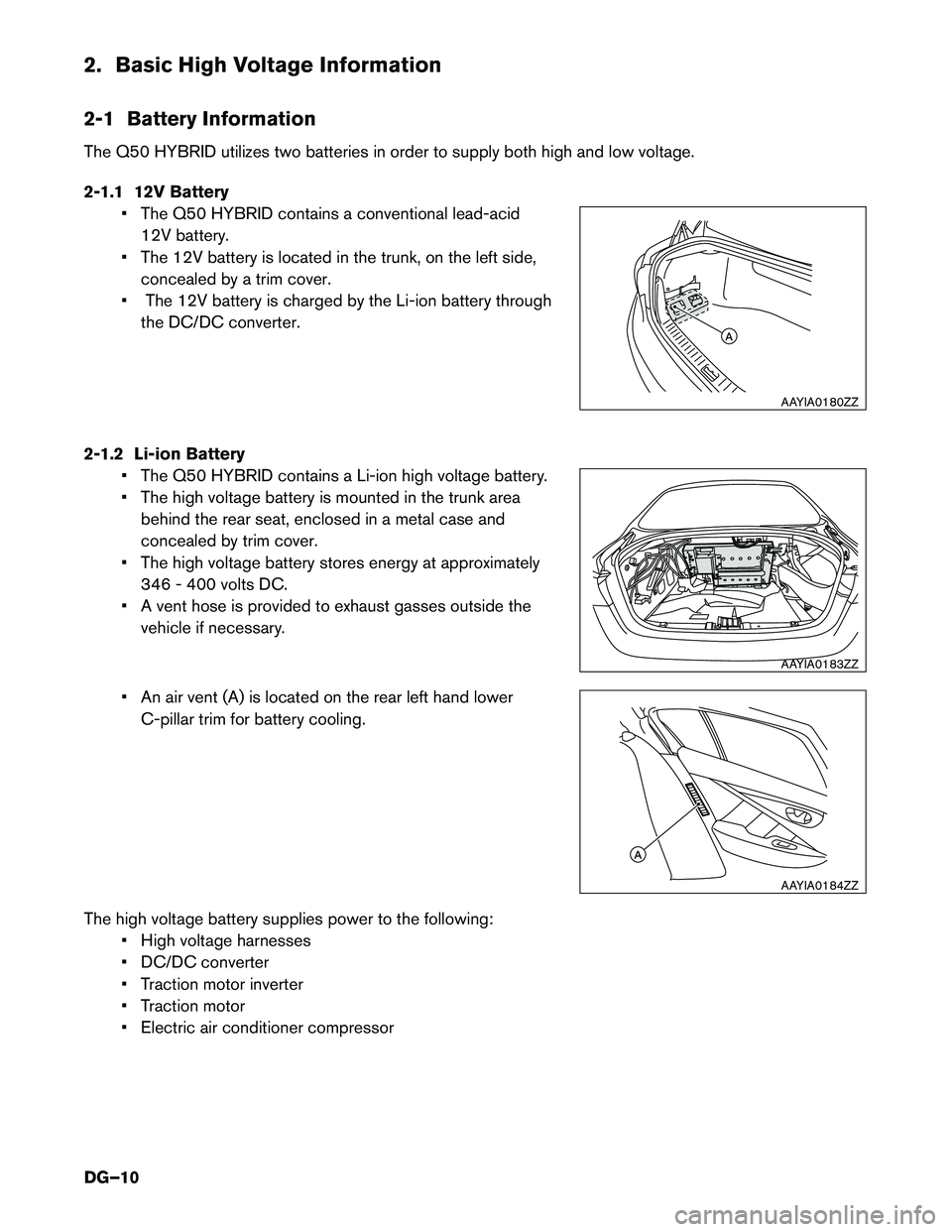
2. Basic High Voltage Information
2-1 Battery Information
The Q50 HYBRID utilizes two batteries in order to supply both high and low voltage.
2-1.1 12V Battery• The Q50 HYBRID contains a conventional lead-acid12V battery.
• The 12V battery is located in the trunk, on the left side, concealed by a trim cover.
• The 12V battery is charged by the Li-ion battery through the DC/DC converter.
2-1.2 Li-ion Battery • The Q50 HYBRID contains a Li-ion high voltage battery.
• The high voltage battery is mounted in the trunk areabehind the rear seat, enclosed in a metal case and
concealed by trim cover.
• The high voltage battery stores energy at approximately 346 - 400 volts DC.
• A vent hose is provided to exhaust gasses outside the vehicle if necessary.
• An air vent (A) is located on the rear left hand lower C-pillar trim for battery cooling.
The high voltage battery supplies power to the following: • High voltage harnesses
• DC/DC converter
• Traction motor inverter
• Traction motor
• Electric air conditioner compressor
A
AAYIA0180ZZ
AAYIA0183ZZ
A
AAYIA0184ZZ
DG–10